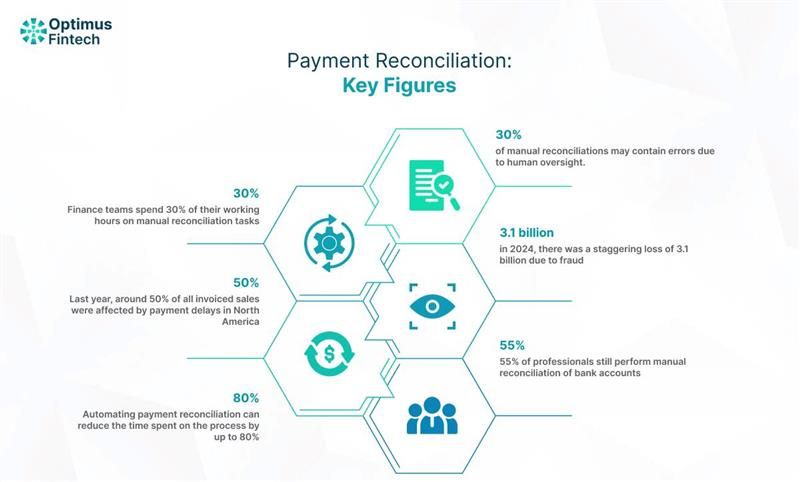Payment Reconciliation
Mastering Payment Reconciliation in 2025: 7 Key Considerations for Merchants
Ensure financial accuracy with these 7 essential payment reconciliation tips for merchants, covering fees, chargebacks, data monitoring, and more.

Amrit Mohanty
Dec 31, 2024 (Last Updated: Nov 6, 2025)

The global reconciliation software market was valued at $1.75 billion in 2023 and is expected to reach $6.44 billion by 2032, indicating a strong CAGR of 15.7% in this period. Such impressive growth is a clear reflection of the growing need for automation in financial processes, especially reconciliation tasks, with businesses seeking greater accuracy and efficiency. Mastering payment reconciliation is not only important but also indispensable for any business operating within the swiftly evolving eCommerce world of today. With complexities spread across multiple platforms, adopting the right practices can make all the difference.
Let's uncover 7 Key Strategies every merchant should know to excel in Payment Reconciliation.

1. AI-Powered Financial Reconciliation: Transforming Accuracy and Efficiency
AI in financial reconciliation is going to revolutionize the accuracy and efficiency of financial operations in 2025. AI-driven systems automate transaction matching, streamline data preparation, and detect anomalies, significantly reducing manual efforts and errors. This automation can save finance teams up to 80% of the time traditionally spent on reconciliation tasks. Additionally, the scalability of artificial intelligence enables it to manage rising transaction volumes without significant supplementary investment, thereby rendering it essential for enterprises undergoing expansion or seasonal variations.
With the adoption of AI-powered reconciliation tools, companies can improve compliance, enhance cash flow forecasting, and enable finance teams to focus on strategic initiatives that help businesses grow and innovate.
2. Automated Financial Close Management: Ditch Fragmented Platforms
The focus of the companies for the year 2025 would be to enhance the financial close management. The aim is to transform the dispersed platforms into integrated, centralized solutions having automated and AI technologies so that it helps in improving the operation and increases the accuracy along with maintaining the compliance of the organization. Business organizations can build a more integrated financial system through the use of integrated applications compatible with different backends. This will enable real-time access to data that can increase the efficiency of operations. Through these technologies, businesses can streamline financial closes, eradicate transaction leakage, accelerate market entry by 95% with ready integrations, and improve back-office efficiency by 90%.
3.Scrutinize Processing Fees: Are They Accurate?
Processing fees, which are usually between 1.15% and 3.15% per transaction, can be a huge cost for merchants. These fees vary depending on the payment method, card type, and issuing bank, so they need to be closely monitored.Regularly reviewing fee structures helps ensure they align with contractual agreements, preventing overcharges or unexpected deductions. Identifying discrepancies early can save merchants thousands of dollars annually, safeguarding their bottom line.
4.Cross-Referencing Payment Data Across Platforms
Merchants often use multiple payment gateways, so reconciliation needs to be consistent across all these systems. Cross-referencing data from payment processors, banks, and accounting software helps create a unified view, minimizing the risk of discrepancies. Regular audits across these platforms can identify mismatched data that requires attention. However, it's important to note that a certain level of mismatch between various analytics platforms is inevitable. Experts generally consider a 5% discrepancy to be acceptable, but if it goes beyond that, then the case calls for closer investigation. Usually, large discrepancies result from a combination of causes rather than one cause alone, so this calls for a closer review.
5.Dispute Resolution: Streamlining Your Process
A survey from last year revealed that 44% of U.S. consumers contested purchases due to fraudulent activity, while first-party fraud disputes now outnumber true fraud cases. Notably, 26% of consumers filed disputes despite being satisfied with their purchase, aiming to secure refunds through credit card protections. Effective dispute resolution is vital for financial accuracy. A streamlined process minimizes delays, reduces chargebacks, and ensures smoother reconciliation. Merchants who act quickly resolve most disputes favorably. Training teams to manage disputes effectively and use transaction data strategically is key to building a strong dispute management system.
6.Regular Reconciliation Schedules
Regular reconciliation schedules are imperative for keeping accurate financial records in a company. Industry knowledge has revealed that most companies can reconcile about 70% of their accounts every month for the timely identification of discrepancies. In addition, data from the APQC also shows that organizations ranked at the 25th percentile spend around 5 hours to finish general ledger reconciliations. On the other hand, organizations ranked at the 75th percentile take up to 10 hours, with a mean of 6 hours. Routine reconciliations enhance accuracy and allow adjustments to be made promptly enough to reduce the possibility of financial misstatements.
7.Continuous Training and Development
An efficient reconciliation process requires investing in continuous training for finance teams. This can result in an increased rate of better performance with decreased error rates as the employees stay informed regarding best practices and technological advances. The profit margin is higher in companies that focus on the training of employees; they have a profit margin of 24%. Thus, investments here help upgrade not only the skills but also team morale. Notably, 92% of employees believe that workplace training positively impacts their job engagement, which increases productivity and job satisfaction.
Summary
The implementation of AI-led applications has further revolutionized reconciliation processes, delivering up to 80% faster audit-to-cash cycles, up to 100 times faster settlement times, and cost savings of approximately $2 million for global enterprises. Optimus Fintech’s cutting-edge payment reconciliation strategies exemplify this transformation, driving efficiency and accuracy for businesses worldwide. With the expansion into new markets such as the UAE and Africa —particularly in the banking sector, including a new banking client—Optimus is poised to deliver exceptional results in 2025. Explore how Optimus Fintech can transform your financial operations and unlock new opportunities by visiting Optimus Fintech.

